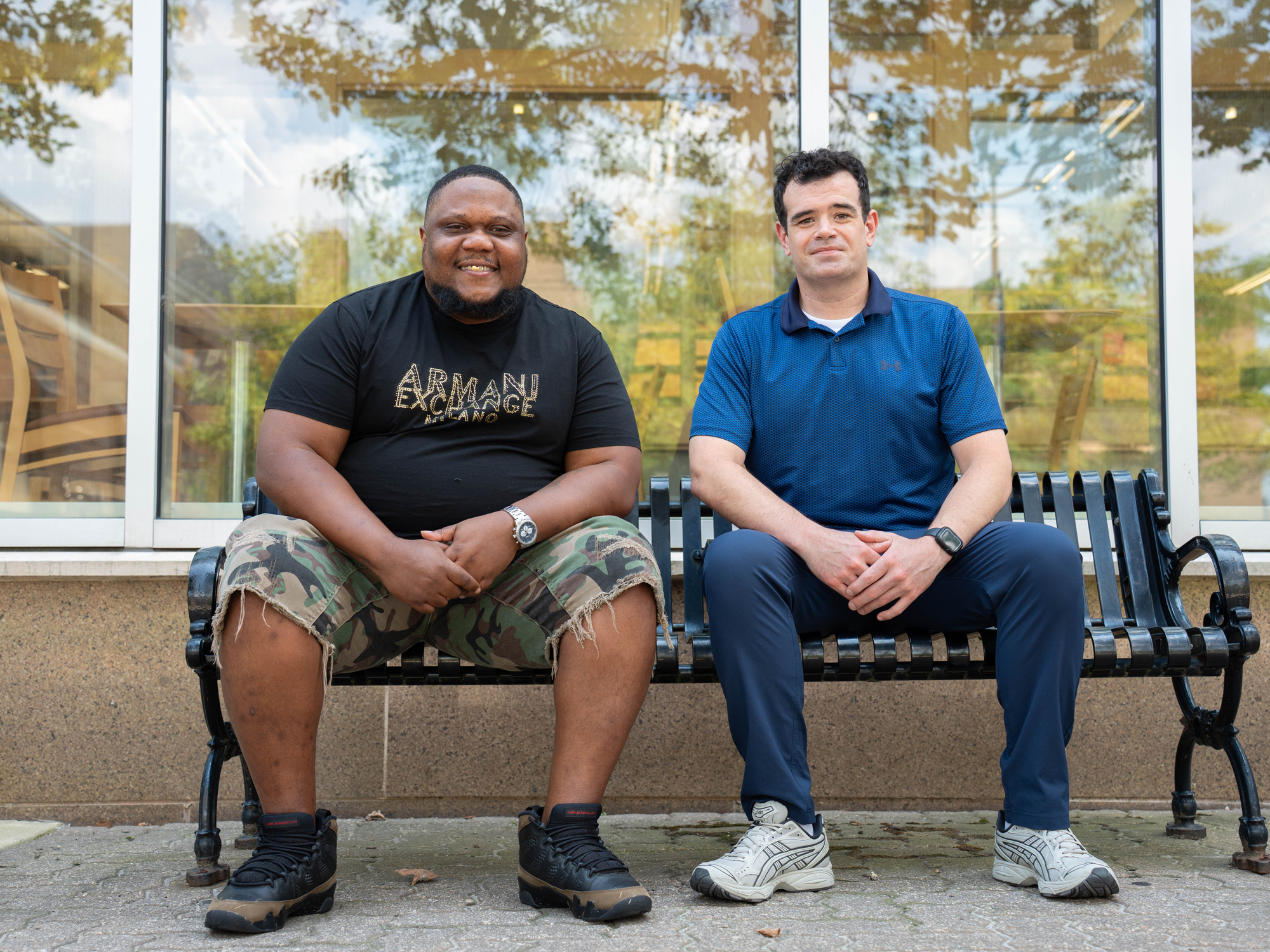
A few years after their release, Bobby Pittman and Kelly Gilliss are going back to Jessup Correctional Institution—not as wards of the state, but as state workers.
The two University of Baltimore alumni are now working for the Second Chance College Program that changed their lives. As a peer navigator and re-entry specialist, Pittman helps incarcerated students prepare for their release and everything they’ll need from housing to support networks. Gilliss is an adjunct faculty member teaching courses on computer programming.
While they have official roles, Pittman and Gilliss are proud to represent hope in a place where it’s rare.
“It means everything to me,” Pittman said of being there. “A guy told me the other day, ‘Every time I see you, I light up,’ because I give him hope, and that means everything to me. That's one thing that I've been trying to bang on people when I was on the inside—no matter how bad you think you're doing right now, it can get better, and it means everything to me to be able to hear that.”
Education Invites New Outlook
Pittman was sentenced to life in prison at 17. He arrived with low self-esteem and little hope for a seemingly dark future.
Others encouraged him, however, and he started working on his reading skills, starting at a third-grade level and quickly excelling from there.
When some local professors started volunteering time to teach college-level classes, Pittman signed up. He recognized hope when it came through the door.
When Dr. Andrea Cantora arrived, the opportunities maximized. Seeing support for non-credited courses, Cantora, a criminal justice professor at UBalt, applied for newly available Pell Grant support in 2016 to start UBalt’s Second Chance program at Jessup. Finally, hopeful students could take courses for credit and work toward a bachelor’s degree.
Pittman, who was in the first cohort, graduated with his B.A. in Human Services Administration in 2024 and is now pursuing a M.A. in Nonprofit Management and Social Entrepreneurship.
“I truly believed that I'm not intelligent. When I started to take those programs, I was being heard and I wanted to challenge myself because I wasn’t good at school,” Pittman said. “I challenged myself and wound up graduating cum laude. I had to go through all that to see all the things that people had told me growing up.”
Gilliss graduated with the same bachelor’s degree in 2023 and continued for an MBA specializing in data analytics. When he graduated in 2025, he became UBalt’s first Second Chance graduate to earn a master’s degree. He also works with the University’s Office of Technology Services as an IT support specialist.
Welcoming the Alums Back
Since its launch, UBalt’s program has seen 17 students graduate. Many seek opportunities to support other new releases.
Thomas Anderson, B.A. ’23, recently launched the Manumission House, a nonprofit organization that offers wraparound services for newly released individuals such as tutoring, referral services, financial assistance and support groups. His board includes a few UBalt alumni, including James Ruffin III, the University’s first Second Chance graduate.
The men’s return to Jessup was unprecedented, but worth every meeting and discussion, according to Cantora, director of UBalt’s Second Chance College Program and criminal justice professor.
“There are policies in place that would normally prevent them from entering the prison to work. But Bobby and Kelly are true role models,” Cantora said. “It hasn’t been easy for them, but they have been incredibly successful in school, work and life overall. The system saw their success and welcomed them back in to help others. Now other incarcerated students tell me they can’t wait to get their master’s degree so they can return and teach. That’s powerful.”
Sharing Hope
Pittman and Gilliss have already felt the impact of their new positions with Second Chance. Correctional officers at Jessup have shared their pride for how far they’ve gone already, and incarcerated students have expressed seeing them as pillars of hope for themselves. Gilliss proudly noted that his first class had 18 students, and everyone submitted their final assignment—a remarkable increase from previous iterations of the same class. He credits this success to his unique perspective.
The positive feedback has helped ease some of the anxieties Gilliss felt about going back.
“We haven’t been home that long, a couple years or less, and we know the majority of guys in there. They sat there with us to take classes. Now I’m teaching them,” he said. “It wasn't easy going in there, but now it's just like, another day, in a sense, and I'm just thinking about getting in there and giving these guys the hope that I was given.”
They know they’re taking a risk going back, but Gilliss said Cantora and all the other professors and specialists they’ve met through Second Chance took their own risks to help them.
“That inspired me to pass that on to others,” he said.

